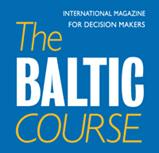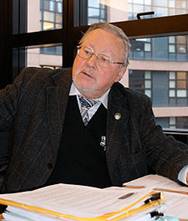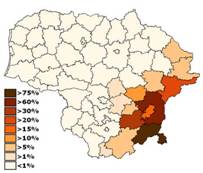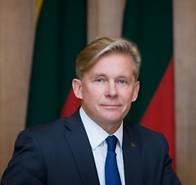
THE VOICE OF INTERNATIONAL LITHUANIA
|
VilNews has its own Google archive! Type a word in the above search box to find any article.
You can also follow us on Facebook. We have two different pages. Click to open and join.
|
News
![]()

By Linas Jegelevicius, www.pbs.org
Online hate speech is becoming more and more widespread in Lithuania and until recently, comments like, "The world needs Hitler again to do the cleansing job," which was posted on a website called Delfi, or "Expel dirty Roma people out of Lithuania" would have gone unheeded by criminal justice.
"Although the Lithuanian Criminal Codex includes sufficient law provisions to prosecute instigators of hate and enmity, these provisions have been largely ignored by criminal judges," Vitoldas Maslauskas, former Vilnius County prosecutor, said last month.
Most law enforcement officials, Maslauskas said, ranging from high-level prosecutors to ordinary investigators, turn a blind eye to the practice of web hate speech for one simple reason: Criminal judges are swamped under real-life infringements and don't have time to chase down Internet bashers who, as a result, go untouched online.
Read more at:
http://www.pbs.org/mediashift/2011/05/in-lithuania-an-overdue-crackdown-on-online-hate-speech139.html
About journalist Linas Jegelevicius:
http://www.journalistdirectory.com/journalist/XigQi/Linas-Jegelevicius
- Bookmark :
- Digg
- del.icio.us
- Stumbleupon
- Redit it
The real estate bottom has passed, experts say
- Posted by - (0) Comment

Urban Edenstrom, BPT Asset Management Managing Director Algirdas Vaitiekunas, and Deputy CEO at East Capital Private Equity Biljana Pehrsson discuss Lithuania’s recovering real estate market.
BALTIC TIMES - Optimism about a real estate recovery in Lithuania was a popular consensus view at the Baltic Real Estate Investment Forum in Vilnius on May 12, with industry experts urging opportunistic property hunters that the market after 2011 would only climb higher.
The threat of towering interest rates by 2015, and the banking sector seriously considering granting major property loans for the first time since the global housing crisis were two key reasons for companies to invest in Lithuanian development property, real estate experts announced at the conference.
“History tells us that future shocks are a certainty. We could have a new Lehman’s every seven years, or every ten,” CEO of Stronghold Invest, Urban Edenstrom, told the audience of industry moguls, referring to the American banking firm Lehman Brothers, whose bankruptcy three years ago was alleged as the primary cause of the recent global financial meltdown. “There is a risk that real long term interest rates might rise significantly by 2015.”
Read more at:
http://www.baltictimes.com/news/articles/28703/
- Bookmark :
- Digg
- del.icio.us
- Stumbleupon
- Redit it
The official version: Lithuanian census shows a more than 10 per cent population decline over the past decade
- Posted by - (0) Comment

By The Associated Press
VILNIUS, Lithuania — Results from Lithuania's census carried out this year show that the country's population has fallen more than 10 per cent over the past decade.
Statistics Lithuania says the Baltic country that borders Belarus and Poland now has 3.05 million residents, compared with more than 3.4 million in 2001.
The results published Monday confirm that rapid emigration and a falling birth rate continue to erode Lithuania's population despite membership in the European Union and quality of life improvements over the past 10 years.
The census was carried out from March to May this year.
- Bookmark :
- Digg
- del.icio.us
- Stumbleupon
- Redit it
The unofficial version: More than 700.000 are believed to have left since Lithuania joined EU
- Posted by - (0) Comment

Current official estimates of Lithuania's population put the figure at around 3.2 million, but early analysis of census figures indicate a more realistic figure to be below 3 million. We remind readers that the population in 1991 was 3.7 million.
Lietuvos Rytas' journalist Edmund Jakilaitis spoke with two experts, Gitana Nausėda of SEB and Rimantas Rudzkis from DnB Nord Bank to better understand the current situation.
Both agreed that it had long been suspected that Lithuania's current population is below 3 million, and more likely around the 2.9 million mark as over 700,000 are believed to have left the country since Lithuania joined the EU.
While the main reason for the exodus of Lithuanian nationals was the weak economic environment and financial crisis, the point was also raised that other countries were undergoing similarly rough times, yet they were not haemorrhaging citizens.
There is some speculation that the government's lack of support for small to medium business is partly at fault and perhaps also the inclination of Lithuanians to try to better their situation as soon as possible, instead of sitting around and waiting for the economic climate to improve.
As always, emigration has both a positive and negative impact and it must be remembered that Lithuanians living abroad send around four billion litas back to Lithuania each year. The current situation however, with so many people leaving the country, is seen as a major disadvantage to Lithuania.
Eurostat data suggests that Lithuania's population might fall to 2.5 million by 2050, but Rudzkis said that 2020 would be the more likely date. By that time the workforce would be depleted and the percentage of older population increased causing a crisis in revenue. Public sector reform should be a top priority.
Source: http://www.litnews.lt/
- Bookmark :
- Digg
- del.icio.us
- Stumbleupon
- Redit it
Prime Minister Kubilius: “Baltic identity to integrate fully with Scandinavia over the next 20 years”
- Posted by - (2) Comment

Norwegian PM Jens Stoltenberg and PM Andrius Kubilius
Prime ministers of Lithuania and Latvia who were visiting Tallinn in connection with the Lennart Meri Conference over the weekend say that everybody agrees that in twenty years the Baltic identity will have integrated fully into the Nordic identity.
“In strategies that we are developing for the next twenty years emphasize that it is important for the Baltic states to become more harmonized and catch up with Scandinavian countries. Integration with Nordic countries is an important objective,” said Andrius Kubilius, Lithuanian prime minister.
“Such integration is beneficial for all countries involved since this a very dynamic and innovative region that follows strict budgetary principles. This is a good brand”.
All Baltic states have something that other two should learn from, said Valdis Dombrovskis, prime minister of Latvia.
Speaking of Baltic identity, Dombrovskis said that Latvians are the most sensitive to it since Estonians sometimes identity themselves as a Nordic country while Lithuanias talk about belonging to Central Europe.
According to the PM, Estonia has good budgetary discipline, Lithuanians were successful in protecting and developing their large industry while Latvians have been successful in developing Riga as a regional hub.
Source:
http://balticbusinessnews.com
- Bookmark :
- Digg
- del.icio.us
- Stumbleupon
- Redit it
Travel Channel to make new movie about Vilnius
- Posted by - (0) Comment

The Travel Channel will shoot its second film about Lithuania and the capital, the Vilnius Tourism Information Center informs.
A few years ago, the popular Travel Channel shot a film about Vilnius and Lithuania, which was shown around the world for two years, writes LETA/ELTA.
The first few days in the Lithuanian capital left a great impression on the film crew.
The concept of the new film – The Third Class Traveler – differs from the previous one. Director Julian Hunter, together with the creative team, strives to reveal the diverse face of the city and get acquainted with it through people living here.
The main idea of the upcoming film – fascinating journeys and exploring cities does not have to cost large sums of money.
The film about Lithuania will be shown for five years in 117 countries across Europe, America, Africa and the Middle East, in 14 languages.
Information about our country will reach 75 million in Travel Channel audience.
Source:

- Bookmark :
- Digg
- del.icio.us
- Stumbleupon
- Redit it
New Lithuanian website spotlights KGB files
- Posted by - (0) Comment
![]()

Professor Vytautas Landsbergis
(AFP) Lithuania on Thursday launched a website dedicated to exposing the activities of the Soviet KGB secret police when the Baltic republic was ruled by the Kremlin.
"For years, the truth was hidden," Prime Minister Andrius Kubilius said in a statement as the state-funded www.kgbveikla.lt went online.
"But today, the more truth there is, the greater freedom is too," added Kubilius, 54, a member of the dissident movement which steered Lithuania to independence in 1991 as the Soviet bloc crumbled.
The site was created under 2010 legislation beefing up efforts to call to account those who collaborated with the KGB during five decades of Soviet rule.
"It's certainly late and limited, but it's still a step in the right direction. It's important, because we'll no longer be hushing up dishonourable acts," independence leader Vytautas Landsbergis, 78, told AFP Thursday.
- Bookmark :
- Digg
- del.icio.us
- Stumbleupon
- Redit it
Gorbachev likely to decline Lithuanian request to speak about his role in the Soviet 1991 crackdown
- Posted by - (0) Comment
![]()

Mikhail Gorbachev is likely to decline a request from Lithuania to give evidence on his role in the Soviet crackdown on the Baltic state's 1991 independence drive, his spokesman said on Thursday.
Lithuanian justice authorities said Wednesday they would like to question the last Soviet leader as a witness in their investigation of the January 1991 crackdown which ended with the deaths of 14 civilians and hundreds wounded.
But Gorbachev's spokesman Vladimir Polyakov said he was likely to decline. "He has dealt with this issue many times, both in his books and in interviews, so everything has been said," he told the Echo of Moscow radio station.
Gorbachev has not received any official request from Lithuanian prosecutors, Polyakov added. The Lithuanian chief prosecutor's office said earlier this week it had sent Russia a formal request for legal assistance in its bid to question Gorbachev.
Soviet troops entered the capital Vilnius after Lithuania declared its secession in 1990 and stormed the city's television tower as tens of thousands of people formed human shields against the troops.
After Lithuania finally won recognition from Moscow as an independent state in September 1991, the Baltic state has sought justice for the crackdown's victims.
Read more at:
http://www.thenewage.co.za/17786-1020-53-Gorbachev_unlikely_to_talk_on_Lithuania_crackdown_spokesman
- Bookmark :
- Digg
- del.icio.us
- Stumbleupon
- Redit it
“It is Lithuanians in the Vilnius region who you should try to integrate and not Poles.”
- Posted by - (1) Comment
![]()

Waldemar Tomaszewski.
The Lithuanian attorney general has opened an investigation into alleged calls for ethnic unrest voiced by Lithuanian MEP (Member of the European Parliament) Waldemar Tomaszewski.
Tomaszewski is also the leader of the Polish Election Action in Lithuania.
The accusation was filed by the Lithuanian Centre Party after Tomaszewski said in an interview with the Respublika daily that;
“It is Lithuanians in the Vilnius region who you should try to integrate and not Poles.”
The attorney general’s office is thought to consider the statement in breach of Art. 170 of the Lithuanian Penal Code, which carries a potential two year prison sentence.
Commenting on negative consequences for the Polish minority in Lithuania introduced by amendments to Lithuania’s Education Act for Respublika in mid April, MEP Tomaszewski further said that;
“We [the Poles] have always been living here. The Lithuanians should integrate, as they are the ones who arrived to this region. This is our land. There are only Polish names at old cemeteries in Vilnius.”
In the 2001 national census, 234,989 persons identified themselves as having Polish ethnicity in Lithuania.
Poland has questioned Lithuania’s implementation of the Friendship Treaty signed by both countries in the early 1990s, which declared that Poles should be allowed to use the Polish spelling of their surnames. The treaty also said that the Polish minority should have access to a Polish education, something that the government in Warsaw questioned last month after changes to Lithuania’s education law.
- Bookmark :
- Digg
- del.icio.us
- Stumbleupon
- Redit it
Last October, the European Voice magazine, published in Brussels, described relations between Poles and Lithuanians as “the worst in Europe”
- Posted by - (0) Comment

The Polish minority in Lithuania (living mostly in the region south-east of Vilnius) numbered 234,989 persons at the 2001 census (6.74% of the total population).
A large ethnic Polish minority was left behind in Lithuania following border shifts in 1945 agreed by the Allies. Before 1939 the mostly Polish-speaking city of Vilnius was part of Poland, a fact which was contested by the Lithuanian state.
Source: http://www.thenews.pl
- Bookmark :
- Digg
- del.icio.us
- Stumbleupon
- Redit it
US-Lithuanian student wins prestigious art prize, will be exhibited in Washington for a year
- Posted by - (0) Comment

Subhadra Semetaite's self-portrait placed first in a 12th Congressional District art competition in the USA. Her artwork, called "SuBa," is done in graphite on paper.
"SuBa," a self-portrait created by US-Lithuanian Subhadra Semetaite, a high school senior at the American UNC School in the Arts, will be displayed for a year in the U.S. Capitol in Washington.
The work, done in graphite on paper, placed first in the 12th Congressional District portion of "An Artistic Discovery," the annual congressional art competition for high school students.
Read more at:
http://www2.journalnow.com/news/2011/may/07/4/wsmet01-local-student-wins-congressional-art-compe-ar-1012380/
- Bookmark :
- Digg
- del.icio.us
- Stumbleupon
- Redit it
I strongly condemn any attacks, aimed to set the Lithuanian society at variance on ethnic, racial or other grounds
- Posted by - (0) Comment

By Audronius Ažubalis, Lithuania’s Minister of Foreign Affairs
“I strongly condemn any attacks, aimed to set the Lithuanian society at variance on ethnic, racial or other grounds. I assess such actions when we are commemorating the Holocaust Remembrance Day as a provocation. This is an audacious challenge not only to the ones who experienced this tragedy, the Jewish community of Lithuania and Litvaks that are scattered all around the world, but also to every decent member of our society.
I believe in the maturity of the Lithuanian society and the State of Lithuania, and of our law enforcement institutions. The instigators of ethnic hatred must be found as soon as possible and punished according to the Law of the Republic of Lithuania. The Government of Lithuania will make continued effort to perpetuate the memory of the Holocaust victims and to raise public tolerance through education.
Racist attacks of the society’s radical groups are hurting the international authority of our State and society. Therefore, I urge the law enforcement institutions to take more vigorous and better coordinated action and fight against them. Also each one of us can contribute to that by disapproving of and speaking up against any actions or statements that are aimed to set the Lithuanian society at variance.”
- Bookmark :
- Digg
- del.icio.us
- Stumbleupon
- Redit it
![]() May 8, 2011
May 8, 2011
By Tanushree Poddar

When Napoleon saw this church, he wanted to carry it away with him on the palm of his hand and gift it to his sweetheart, Josephine,” our guide informed us with a twinkle in her eyes.
“Thankfully, he could not fulfill his wishes and the church still remains in Vilnius.” I was not surprised.
I would have liked to carry the stunning church home, too. St. Anne’s church evokes covetousness in all breasts. It is so beautiful.
Vilnius, the capital of Lithuania, is an artist’s dream. With its emerald forests, cobalt lakes, cerise spires and pine scented air, it is a romantic paradise. Apart from lovely landscape, it has some of the most beautiful churches I have ever seen.
Read more at:
http://www.deccanchronicle.com/tabloid/sunday-chronicle/travel/romantic-paradise-187
The Deccan Chronicle is a daily newspaper published through the Andhra Pradesh, Karnataka, and Tamil Nadu states ofIndia. It is published in English, and is the largest circulation English-language newspaper in the south of India.The newspaper's name derives from the originating place Deccan regions of India.
- Bookmark :
- Digg
- del.icio.us
- Stumbleupon
- Redit it
With love, from Italy
- Posted by - (0) Comment
I wanted to share with you some good memories of my time in Lithuania 2 years ago. I do miss your country. With love, from Italy.

- Bookmark :
- Digg
- del.icio.us
- Stumbleupon
- Redit it
Since moving back to the UK in 2008 I have not read a single positive story about Lithuania
- Posted by - (0) Comment
I got onto a flight from Edinburgh to London on Wednesday and got to read about this sad story in the newspaper. It was very disturbing. Since we moved back to the UK in 2008, I have not read a single positive story reported about Lithuanians. Can someone please prove me wrong??
(see the below article)
- Bookmark :
- Digg
- del.icio.us
- Stumbleupon
- Redit it
SCOTLAND: 26 year old Lithuanian mother accused of murdering her newborn baby
- Posted by - (0) Comment

It was here, in Aberdeenshire, Scotland, that the young Lithuanian mother allegedly murdered her newborn son last year
Ineta Dzinguviene, 26, is accused of murdering her baby on the day he was born and dumping his body in a holdall in Aberdeenshire. Scotland.
Ineta Dzinguviene, 26, is accused of asphyxiating the newborn, later named Paulius Dzingus, by holding the clear plastic food wrapping over his nose or mouth, or by other means.
Dzinguviene, of Fraserburgh, Aberdeenshire, is alleged to have carried out the murder at a flat on the High Street in the fishing port on April 12 last year.
Read more at:
http://news.stv.tv/scotland/north/245100-mother-murdered-her-new-born-son-and-hid-his-body-in-bag-court-hears/
- Bookmark :
- Digg
- del.icio.us
- Stumbleupon
- Redit it
VilNews e-magazine is published in Vilnius, Lithuania. Editor-in-Chief: Mr. Aage Myhre. Inquires to the editors: editor@VilNews.com.
Code of Ethics: See Section 2 – about VilNews. VilNews is not responsible for content on external links/web pages.
HOW TO ADVERTISE IN VILNEWS.
All content is copyrighted © 2011. UAB ‘VilNews’.

 Click on the buttons to open and read each of VilNews' 18 sub-sections
Click on the buttons to open and read each of VilNews' 18 sub-sections 

















.jpg)



